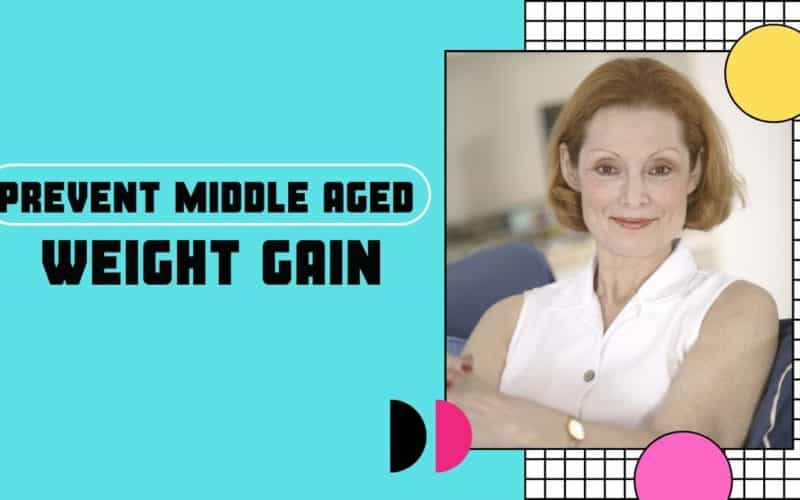No one can pinpoint the exact moment it happens. One minute, you’re sliding your jeans over a perfectly toned body, and the next day you have more rolls than a bakery. There are some physical factors that cause middle-aged weight gain, and while some of them are lifestyle-related, others have to do with physical factors largely beyond your control.
Table of Contents
What Cause Middle Aged Weight Gain
Before we dive into ten ways to prevent middle-aged weight gain, let’s take a look at some of the factors that can cause it.
1. Physical factors
There are many physical factors behind weight gain in middle age. Both men and women will see a significant decrease in the hormone that controls metabolism. This can lead to an increase of anywhere from one to two pounds across their midsections annually.
For men, a decrease in testosterone is a culprit. Testosterone binds with fat, helping it to pass out of the body. It is also responsible for muscle development. Men begin to lose approximately 1% of their testosterone level every year once they hit their thirties.
This triggers the body to begin to store fat. For women, menopausal weight gain is common. While estrogen levels drop fairly quickly, progesterone levels are slower to drop, leading to an increase in fat stores around their abdomens.
For both men and women, imbalances in hormonal levels lead to a decrease in muscle mass. Muscle is the top user of glucose, so the body converts the now unneeded extra glucose to fat. Additionally, your muscle mass is what helps you use carbs efficiently, so as your muscle mass drops, your ability to process carbs lowers as well.
2. Genetic factors
Genetic factors also leading to middle-aged weight gain. Both men and women may be genetically predisposed to gain weight during middle age. Scientists report that the presence of one particular gene, IRX3, is the number one genetic risk factor for weight gain.
3. Other factors
After physical and genetic factors, there are some other factors also contributing to weight gain as we age. Research has shown that pollutants can alter our body’s metabolism. Some of these pollutants are found in plastics and pesticides that are sprayed on plants we consume, and even in the fat stores of meat-producing animals.
Stress has been shown to be a huge factor in weight gain as well. Not only is stress a physical factor that promotes weight gain by releasing the chemical cortisol, but it is also an emotional one as well.
People make bad lifestyle choices because of stress, choosing sugary and fast foods because they are quick and easy to eat. Stress will interfere with our sleep patterns, causing sleep disturbances that also contribute to fat production.
Lifestyle factors that cause weight gain: Bad food choices and no time to exercise fall under this category, as do sedentary lifestyles and office desk jobs.
How to Prevent Middle-Aged Weight Gain
1. Drink more water
Drinking up to eight 8-ounce servings of water a day will help to prevent weight gain and to lose weight. A good rule of thumb to make sure you are drinking enough is that for every pound you weigh, you should consume a half-ounce to one full ounce of water. Why does it work?
Drinking a glass of water before a meal will fill your stomach, allowing you to feel satisfied with a lesser amount of food. Additionally, replacing other beverages with water will help to lower your total caloric intake, and increase the number of calories you burn for up to an hour after you drink it.
And lastly, drinking water will combat dehydration. One of the classic signs of dehydration is exhaustion, which we combat by loading up on carbs and sugars.
2. Adjust your diet
Adjust your diet to include more protein and less carbs. Eat a protein with every meal. Proteins are found in lean meats, fish, dairy products, seeds, and nuts. Decrease your refined carbs such as those found in bread and pasta. Why does it work?
Because your muscle mass decreases with age, your ability to process carbs as you did when you were younger will diminish as well. Protein is considered the building block for muscle, so eating protein will help you to stop middle-aged weight gain.
3. Lower your stress levels
Streamline your daily schedule to be as easy as possible, take a meditation or yoga class, and if you are overworked, learn to just say no. Why does it work?
High levels of stress cause the release of a fat building hormone called cortisol. Additionally, being stressed will cause lifestyle changes that will result in weight gains, such as lost sleep and poor eating habits. You can also follow the ten methods used and recommended by professionals to help relieve stress.
4. Get enough sleep
Make sure you get your full, uninterrupted eight hours of sleep or more per night. Lake of sleep has different consequences on our mind, mood, and body such as memory loss, frequent illnesses, lashing out, irritability, and weight gain. So, it is important to make sure that we are sleeping better and sufficient at night. Why does it work?
When we are tired, we go straight for the sugar boost that comes from unhealthy food choices such as donuts and pastries. Our bodies crave sugar and carbs to combat fatigue, but the boost is temporary and you will end up feeling even more tired than you were before you ate.
5. Work on rebuilding your muscle mass
Resistance training is a great way to replenish your muscle mass. Why does it work?
There is a direct correlation between the amount of muscle you have and how many calories you burn. Remember that muscle is fueled by glucose, and if your muscles aren’t consuming the glucose, your body will begin to store it instead.
6. Don’t skip meals
Make sure to eat at least three balanced meals per day; in fact, some experts recommend eating six small and healthy meals throughout the day. Why does it work?
When you skip meals, you throw your body into a metabolic tailspin. Your body thinks that it is starving, and will slow your metabolism down. Your body will begin to store away extra fat reserves to combat “starvation”.
Additionally, skipping meals means that your fuel reserves will run low, and you will grab energy however you can, usually with something sugary and high carb.
7. Allow yourself a forbidden treat
Even if you are dieting, allow yourself a treat or even a cheat day. Obviously, don’t eat an entire pizza with a chocolate cake and wash it down with a milkshake, but allowing yourself to indulge every now and then is a key secret to a successful diet plan. Why does it work?
The number one reason a diet plan will fail is that the person dieting is tempted by things that are on the “no-no” list. Eventually, the dieter will give in to that temptation and overindulge in a treat they have been denying themselves. It is better to give yourself a treat once in a while then to overindulge or binge eat and fail at the diet altogether.
8. Monitor the cardio
Aerobics used to be the trending thing touted as a great way to lose weight at the middle-aged. While it is better than nothing, it isn’t the best way to get in shape. A balance of strength training on top of cardio is more effective than cardio alone. Why does it work
Overdoing the cardio workouts actually breaks down your muscle mass when you do it for too long at a time. Building lean muscle helps you to increase your metabolism, too.
9. Chew, chew
Take your time eating, chew thoroughly, use of smaller plates for your meals. Eating slow is another best way to get a flat stomach. Why does it work?
When you take more time and slow down when you eat, you give your brain a chance to catch up to your stomach. Your stomach can actually be full long before your brain realizes it and shuts off your “hunger alerts.” Smaller plates trick your brain into thinking you have a larger portion on your plate, allowing you to feel satisfied with your food portions.
10. Stay away from diets
Diets that promise incredible weight loss in the space of a week or two may seem too good to be true, and that’s because they are. It is more effective to dial back your weight loss expectations to around one to two pounds a week and plan to eat healthier rather than go on a fad diet. Why does it work?
Fad diets may allow weight loss, but much of it is water. As soon as the diet is stopped, your weight will return. Instead of fad diets, create your own diets with healthy meal choices that you can continue after you have achieved your weight goals for a lasting weight loss.
These ten ways to prevent middle-age weight gain are backed by research and proven to be successful. Middle age doesn’t have to mean gaining weight if you take a healthy approach to your eating and lifestyle habits.





